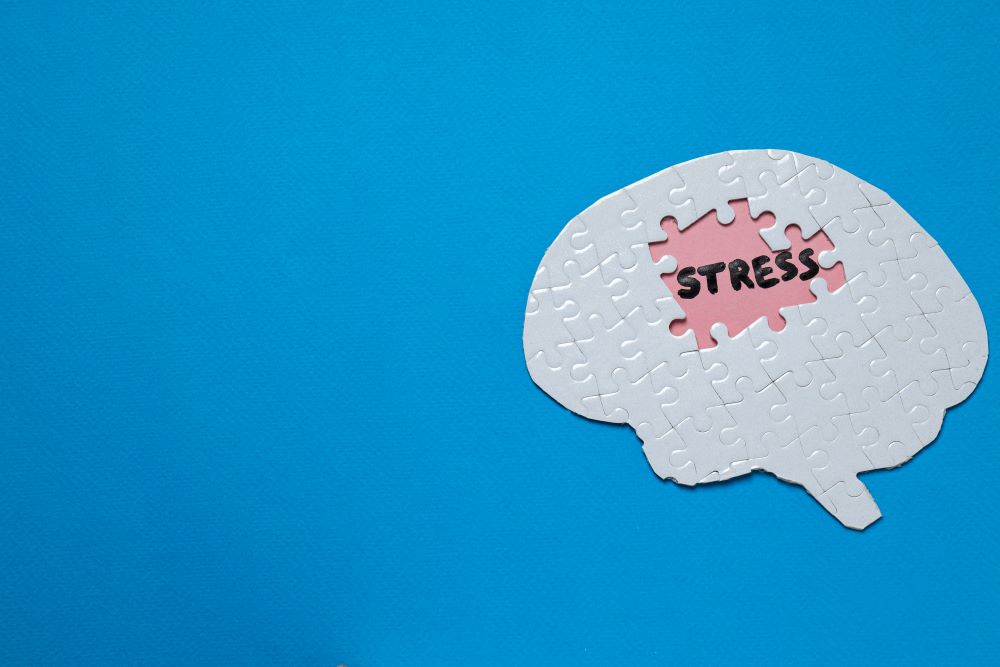How Does Stress Affect the Immune System?

The immune system is responsible for protecting the human body from external attacks. It is, therefore, a mandate to keep the immunity strong. According to health researchers, stress is deeply linked to the immune system. Thus, individuals need to reduce stress and tension for healthy immunity.
Stress can attack the immune system depending on the type and cause of stress. Are you curious to know how stress affects the immune system? Find out all about it with this article.

Table of Contents

What is Stress?

Stress is a state of worry or mental tension caused by a challenging situation. The body's defences quickly and automatically go into high gear when it detects real or imagined danger. Your body reacts to demands and threats alike by going into stress.
Short-term stress can manifest itself, for instance, as anxiety over an exam that is scheduled for next week. Long-term stress can also come from situations like losing your work and finding yourself in a tight spot financially for a few months.
What are the Different Types of Stress?
Stress comes in various forms. However, according to studies on the many forms of stress in psychology, there are three main categories of stress:
What are the Causes of Stress?
Stressors are associated with negative things like a demanding work schedule or a difficult relationship. Not every stress is brought on by outside forces. When you worry excessively about something that could or might not happen or have unreasonable, negative beliefs about life, you might also experience internal or self-generated stress.
Typical external stressors include:
- Major life changes.
- Work or school problems.
- Relationship difficulties.
- Financial troubles.
- Being too busy.
- Children and family.
Common internal causes of stress include:
- Pessimism, a negative outlook on life.
- Inability to accept uncertainty.
- Rigid thinking, lack of flexibility.
- Negative self-talk.
- Unrealistic expectations/perfectionism.
- All-or-nothing attitude.
How Does Stress Affect the Immune System?
The immune system is mainly responsible for dealing with germs and viruses invading the human body, thereby protecting it from getting sick. It contains several white blood cells (lymphocytes and phagocytes) capable of fighting against bacteria, viruses, and cancer cells in your body. Various factors affect the activities and efficiency of the immune system, and stress is one of these.
Stress creates a hormone in your body called cortisol, which can suppress the effectiveness of your immune system. The effect of stress on the immune system mainly comes from this hormone. It often lowers the number of lymphocytes, which reduces the immune system’s ability to fight against germs and diseases. In addition, it interferes with the interaction between healthy white blood cells.
It might be tricky to analyse how stress affects the immune system because it can happen from various conditions. For example, when an individual has elevated stress levels, it remains that way for a long time, frequently releasing stress hormones even after a stressful event has passed. Moreover, people often resort to unhealthy practices, such as smoking, drinking and substance abuse while being stressed. These might generate the following health conditions.
- Cold, flu and headache
- Cardiovascular disease
- Diabetes
- Asthma
- Gastric ulcers
Well, these major health issues are covered under a health insurance plan, which provides financial support when needed, but staying active, exercising, and eating healthy can help you avoid chronic health conditions.
How Are Stress and Immune System Functions Related to Each Other?
Now that stress affects the immune system, let us determine how stress and the immune system functions are linked. It is known that the immune system is connected with the entire body and its overall operations. Stress can affect all these functions, weakening immunity by damaging these.
1. Musculoskeletal System
Your muscles tend to tense up when you are under stress. Chronic stress causes the muscles to stay in this condition for a long time. As a result, the condition triggers other body reactions, such as headaches. Moreover, people who are scared of pain and re-injury are prone to take longer for recovery than others. Muscle tension, causing subsequent muscle atrophy, can promote chronic musculoskeletal conditions.
2. Respiratory System
While analysing stress and its effects on immunity, the respiration issues can be significant. Stress and other strong emotions can cause damage to this system, resulting in a constriction of the nose and lungs. It often causes shortness of breath and rapid breathing. People already suffering from asthma and chronic obstructive pulmonary disease can face serious health concerns because of stress.
3. Cardiovascular System
The wellbeing of the heart and blood vessels is imperative to having a healthy immunity. Acute stress, which occurs in difficult pressuring situations, can cause increased heart rate and stronger contractions of the heart muscles. Chronic stress contributes to long term heart and blood-related diseases. Furthermore, acute and chronic stress issues can also cause inflammation in the circulatory system.
4. Endocrine System
When considering how stress weakens the immune system, stress processing should be considered. The brain uses a hypothalamic-pituitary-adrenal (HPA) axis to initiate a situation considered stressful and threatening. The hypothalamus is a collection of nuclei that connects the brain and the endocrine system. In stressful situations, it signals the pituitary gland to produce more cortisol. This hormone mobilises glucose and fatty acids from the liver, causing severe physical damage.
5. Gastrointestinal System
Medical practitioners believe that the brain has a direct connection with the gut. Stress can affect this connection triggering pain, bloating and other discomforts. According to previous case studies, people tend to eat more when under stress. They also indulge in smoking tobacco, drinking alcohol, and substance abuse, resulting in heartburn or acid flux. Stress can also make it difficult to swallow food, causing burping, gassiness, and bloating.
Furthermore, stress causes severe stomach discomfort, such as pain, nausea and bloating. Vomiting is also common during extreme stress. Stomach ulcers, if already present, can become more bothersome under stress. Additionally, stress affects the movement of food within the body, causing either diarrhoea or constipation.
6. Nervous System
The nervous system is divided between the central division with the brain and spinal cord and the peripheral division with the autonomic and somatic nervous systems. When stressed, your sympathetic nervous system (SNS) shifts its energy resources towards either fighting an enemy or fleeing off from it. At first, the SNS signals the adrenal glands for releasing adrenalin (epinephrine) and cortisol, causing rapid heartbeat and increased reparation.
Once the stressful event is over, your body tries to recover. However, the parasympathetic nervous system (PNS) and its overactivation in this condition can contribute to bronchoconstriction, such as asthma or excessive vasodilation.
7. Reproductive System
While considering what the effects of stress on the immune system are, one might consider the reproductive system. In terms of men, chronic stress can cause testosterone production resulting in a decline in sex drive or libido. It can also harm sperm production and maturation. Doctors often find a lower percentage of sperm motility in stressful males. They can also be vulnerable to infections in the testes, prostate gland, and urethra.
In women, stress often influences the menstruation cycle, causing absent or irregular cycles and painful periods. Stress is also known for negatively impacting female pregnancy, affecting their ability to conceive, pregnancy health and postpartum adjustment. Moreover, stress and pressure in life can reduce sexual desire in women. Stressful women might experience cramps, fluid retention and bloat, and mood swings in their premenstrual conditions.
Signs and Symptoms of Chronic Stress

The chemicals your body produces under stressful conditions can cause many mental, bodily, and emotional reactions when you're stressed out. A lot of stress-related symptoms might not be apparent.
For this reason, it's critical to understand the typical signs of elevated stress. Different symptoms of chronic stress are:
- Cognitive Symptoms
- Emotional Symptoms
- Physical Symptoms
- Behavioural Symptoms
Cognitive Symptoms
Each of these symptoms reflects how stress impacts cognitive functioning and mental well-being. Here's a breakdown of each cognitive symptom of stress:
Emotional Symptoms
These emotional symptoms illustrate how stress can significantly impact mental health and emotional stability. Here’s an explanation of each emotional symptom of stress:
Physical Symptoms
These physical symptoms highlight the widespread impact of stress on various bodily systems and how it can manifest in acute and chronic health issues. Here’s an explanation of each physical symptom of stress:
Behavioural Symptoms
These behavioural symptoms reflect how stress can alter everyday habits and routines, often in ways that may initially seem like coping mechanisms but can ultimately impact overall well-being. Here’s an explanation of each behavioural symptom of stress:
Difference Between Stress and Anxiety

Anxiety and stress are frequently used synonymously. There are some noticeable variations between the two but also some shared symptoms. Knowing these distinctions is crucial because it will enable you to choose the best course for symptom management and mental health enhancement.
What are the Helpful Ways to Fight Stress?

Now that you know how stress affects your immune system, find out how to avoid stress in the following section:
Hopefully this article answers your doubts regarding how stress affects the immune system. Stress is a serious condition that can cause severe medical conditions in different organs. As a result, individuals suffer from diseases, as their immunity cannot protect them. It is, therefore, essential to avoid stress for a healthy life.














